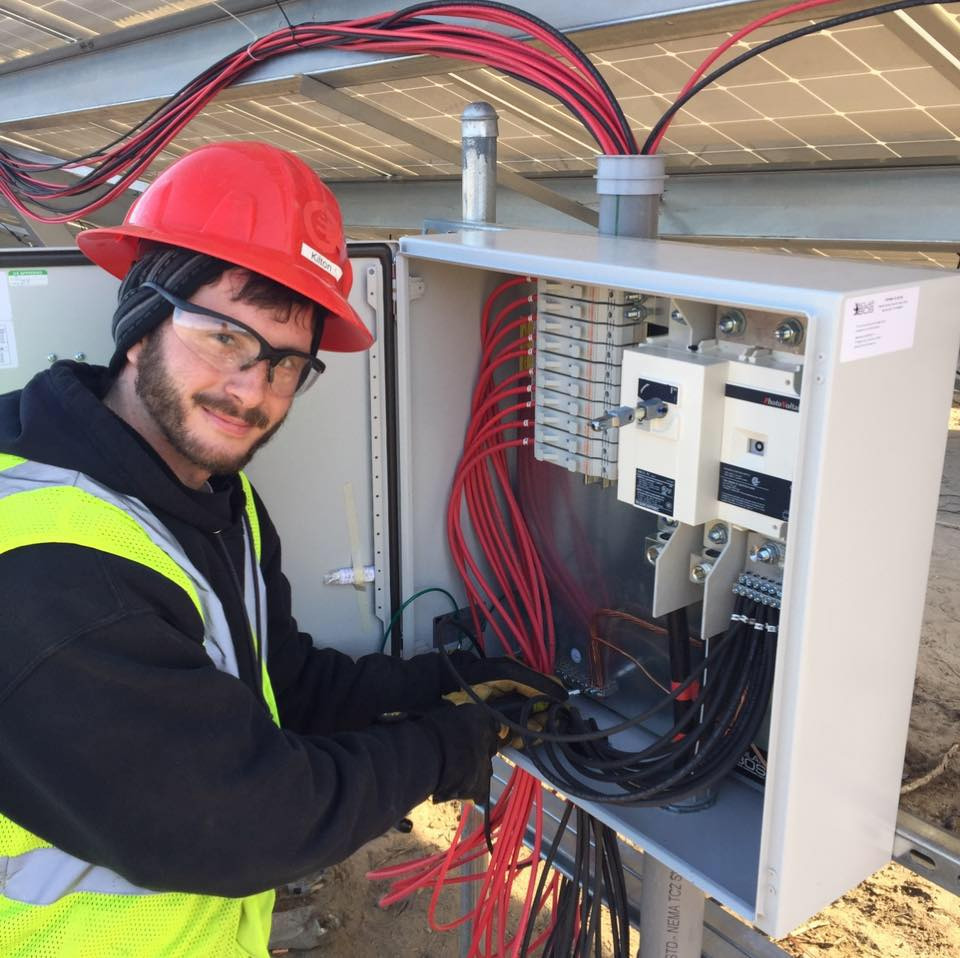Kilton Webb
Kilton Webb is a union electrician with IBEW Local 567 in Auburn, Maine. He recently finished his apprenticeship classes and will soon test to become a journeyman electrician.
“You can’t make things better if you don’t train the next generation of workers. And you can’t just hire any company to do this work, we need union training. We need the best. Solar fields specifically have been great for apprentices because you just need so many people. Since the solar boom took off a few years ago, it’s given everyone work. We’re training the next generation in these fields.”
In what ways do you think of your job as “climate work?”
Being an electrician definitely has climate aspects, not necessarily everything, but we find ourselves on the forefront of climate work in a lot of ways. Anything that revolves around power involves electricians. We find ourselves on solar fields or building EV charging stations. We’re the ones doing that work and the demand is only going up.
It can be a blessing and a curse: the amount of work we’re getting is increasing more and more due to the increase in renewable energy projects. Sometimes, it almost seems like it’s too much work and they’re aren’t enough people to fill all the jobs. We definitely keep busy. […] I can’t speak for New York or Texas, but here in Maine, the average age of an electrician is 56 years old. It’s an aging job and we’re recruiting heavily to fill the spots that open up from people retiring and beyond that, just bring more people into the industry. It’s all the trades too, we need more people to keep up with the amount of work.
And what about in your community? You say you’ve lived in Maine your whole life, have you seen any changes related to climate?
I’ve noticed that there is more worry of wells drying out. Growing up, I lived right next to a lake, so our well was in a good spot, but my uncle lived on a hill and had to keep digging deeper and deeper, hundreds of feet, to keep getting water. Eventually, it dried out anyway and they were without water for a month and a half. They had to call a company to come dig even deeper and hit the next vein of water, which is wildly expensive, but you do whatever you have to do to get water.
Why is being a union member important to you?
Being a union member is important to me because it allowed me to learn a trade, especially in the earn-while-you-learn model. I didn’t pay to learn, I was paid to take classes. It cost about $600 a year. That’s pocket change. And I know, I went to college.
What was your degree in? And what made you decide to switch to an apprenticeship?
I went to school to study global studies. I went to Haiti to install water filters, but the more I learned, the more I doubted that I could make a meaningful difference. I learned how to identify problems, not really how to solve them. I dropped out of college after my second year and became an electrician apprentice because I felt I could effect concrete change better that way. Locally. The union apprenticeship turned out to be the best way to do that. I didn’t even know that much about unions when I started looking into becoming an electrician, but I happened upon the IBEW and their program was the best one by far.
And what does being in a union mean to you?
I’m also involved with the AFL-CIO and I hear a lot from fledgling unions trying to get started. The struggle and strife [workers] go through, just to start a union! I have the privilege of being a part of [the IBEW], one of the oldest and strongest unions in the country. It feels like such a privilege. For example, I never have to pay for any of my own tools, but I see non-union electricians having to pay for everything out of pocket, which can set you back thousands of dollars. We get to negotiate our contract every three years and bring our demands to the contractors. We get to democratically decide where our money goes and get to figure out things together. We make the choices and decisions that affect our lives.
Building off that, recently unions in Maine organized around the passage of a new state law that enacts strong labor standards for renewable energy projects that will raise the quality and pay of clean energy jobs. The legislation, LD 1969, also establishes strong equity standards for pre-apprenticeship programs. Why is this important for workers and communities in Maine?
It’s extremely important because it continues to show that we’re fighting climate change. This isn’t something that’s going to pass if we do nothing. It’s not something that has a quick fix either. You can’t make things better if you don’t train the next generation of workers. And you can’t just hire any company to do this work, we need union training. We need the best. Solar fields specifically have been great for apprentices because you just need so many people. Since the solar boom took off a few years ago, it’s given everyone work. We’re training the next generation in these fields.
One of the things I’m most excited about in this law is the child care provision. Maine is the oldest state, which means that we’re not doing a great job in attracting young families. A way to break out of that, I think, is to provide incentives to attract younger people. Maine is a beautiful state and I hate the idea of it shrinking in population. It’s also very cool seeing more women joining the apprenticeship. Seems like every year, there are more women. Anything that helps and supports women and people of color to see that the trades are open to everyone is fantastic.
This interview has been condensed and edited for content and clarity.

